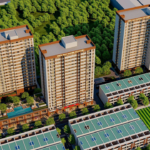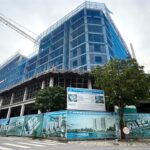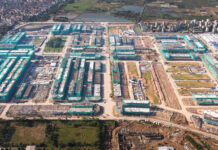Social Housing Becomes a ‘Profit Mine’: Uncovering the Gray Area for Legal Loopholes
Numerous Challenges in Implementation
“Citizens have to stay up all night queuing to buy social housing, while brokers exploit them—the policy loses its meaning,” shared Dr. Bùi Sỹ Lợi, former Deputy Chairman of the National Assembly’s Committee on Culture and Society, with us.
The reality aligns with the concerns of the former National Assembly delegate. Rising social housing prices, file price gouging, and markups of hundreds of millions make the dream of owning a home for Thu Hường (37, Ho Chi Minh City) increasingly distant.
Having moved from her hometown in Đắk Lắk to Ho Chi Minh City 18 years ago, Hường recalls earning over 1 million VND per month in 2007, with rent costing 300,000 VND. A room of less than 20m² housed five of her fellow expatriates.
By 2025, her rent and utilities had risen to 4 million VND per month, while her garment worker salary (without overtime) was only 8 million VND.
“After paying rent and essential living expenses, I’m broke. Sometimes, I skip breakfast because a bowl of noodles costs at least 25,000–30,000 VND. The dream of owning a small home to avoid monthly rent feels so out of reach,” she shared.
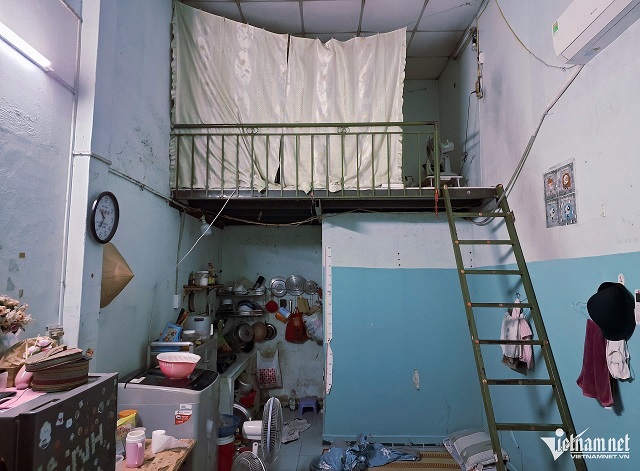
Thu Hường has been living in this rented room in Ho Chi Minh City for many years. Photo: T.C
|
According to the 2023 Vietnam Social Housing Report by Cushman & Wakefield, housing prices in Vietnam are approximately 20 times higher than the average annual income, making homeownership increasingly difficult for Vietnamese people.
Meanwhile, the demand for social housing for low-income workers in industrial zones is estimated at 2.4 million units for 2021–2030, according to a survey by the Ministry of Construction. Even with existing and future supply, the market will still face a shortage of over 1 million units, equivalent to 51% of total demand.
This situation calls for rebalancing solutions. Developing social housing as a tool to ensure social welfare and promote the sustainability of the real estate market is essential.
However, Dr. Nguyễn Hoàng Bình, a lecturer at RMIT University Vietnam’s School of Business, notes limitations and challenges in policies related to social housing developers.
Currently, land preparation and allocation procedures are lengthy and risky. Detailed planning, social housing land allocation, land-use conversion, and site clearance all take time. Additionally, project bidding or designation mechanisms vary among localities, and land-use coefficients are unreasonable.
Moreover, preferential capital for both supply (developers) and demand (buyers) is unstable. High commercial credit interest rates and price caps result in thin profit margins, deterring businesses. Long-term fundraising tools like social bonds remain ineffective.
Risk mitigation mechanisms are also limited. For instance, the ratio of commercial space to offset costs is inflexible; transferable development rights are rarely effectively applied; and investor selection processes lack transparency and are prolonged.
As a social housing developer, Trần Đức Quang, representative of Nam Long Corporation’s Can Tho branch, notes that businesses face challenges like high input costs, complex investment procedures, lack of clean land, and limited credit access.
“Social housing projects typically have low profit margins and require a profit cap commitment to the government. Complex investment procedures discourage many businesses. The biggest challenge in project implementation is legal procedures and balancing sale prices with residents’ quality of life,” Quang said.
Additionally, he noted, eligibility confirmation for social housing buyers is flawed. For freelance workers, some commune and ward authorities lack sufficient grounds to verify their income.
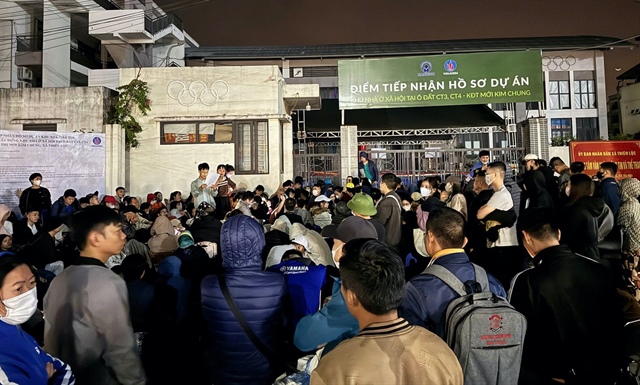 Citizens wait overnight at a social housing application site in Hanoi on November 17. Photo: NVCC |
Solutions to Reduce Broker Exploitations and Clear Bottlenecks
Regarding solutions to support social housing developers, RMIT University Vietnam members suggest that localities proactively prepare clean land (with cleared sites) and announce preferential land-use coefficients based on distance from the city center or metro stations (if applicable).
Relevant agencies should study a mechanism for “additional development rights” for social housing projects in height-restricted areas, allowing rights to be sold or transferred to other city areas within a timeframe. This would provide flexibility for developers and reduce budget pressure.
In terms of capital and finance, the government should implement effective preferential credit packages for suppliers (lower-than-market interest rates, construction phase grace periods) and support buyers through the Vietnam Bank for Social Policies and recapitalized commercial banks. Encouraging social bonds for long-term social housing project funding is essential.
Regarding legal procedures, Dr. Bình suggests establishing a one-stop urban-level model for bidding and selecting social housing investors, with specific timelines for each stage (planning, land, environment, fire safety, construction permits).
Citing Singapore’s example, Dr. Bình notes that the country developed a housing system primarily built by the Housing & Development Board (HDB).
The HDB model achieves key goals, such as concentrating land and planning Transit-Oriented Development (TOD) clusters; creating a stable supply-demand chain; standardizing designs and industrializing construction to reduce costs and time; and providing financial support for buyers (subsidies, long-term loans linked to pensions) to ensure developer liquidity.
Dr. Bùi Sỹ Lợi emphasizes that the mismatch between social housing supply and demand leads to conflicts. The government must create sufficient supply to meet citizens’ needs.
State management agencies should select fully committed social housing investors. To attract good investors, the government must provide procedural, land, capital, and tax mechanisms so developers can complete projects without losses. After a project, businesses need low profits for reinvestment.
Additionally, a list of genuine applicants must be created, verified through government and local data.
He proposes prioritizing buyers: those without homes (Priority 1), those in cramped spaces (Priority 2), those in low-quality homes (Priority 3), and those with temporary housing or living with family (lower priority).
“Most importantly, authorities must identify those truly in need. With transparent data, broker exploitation and social housing file price gouging can be reduced,” Dr. Lợi stressed.
Trần Chung
– 05:45 21/11/2025
Establishing a National Housing Fund at Central and Local Levels: Lease-Only, No Sale
The National Housing Fund is set to invest in the development of affordable social housing and essential socio-technical infrastructure, all available for lease.
National Housing Fund Operations: Government Releases Detailed Regulations
The Vietnamese government has recently issued Decree No. 302/2025/NĐ-CP, dated November 19, 2025, which provides detailed regulations on the National Housing Fund. This decree also outlines measures to implement Resolution No. 201/2025/QH15, passed by the National Assembly on May 29, 2025. The resolution pilots specific mechanisms and policies aimed at fostering the development of social housing.
Social Housing Turns into a ‘Profit Mine’: Uncovering the Gray Area of Legal Loopholes
The vast disparity between social housing and commercial housing has fueled rampant speculation in the social housing market, transforming a vital welfare policy into a commodified asset for speculative investment.


